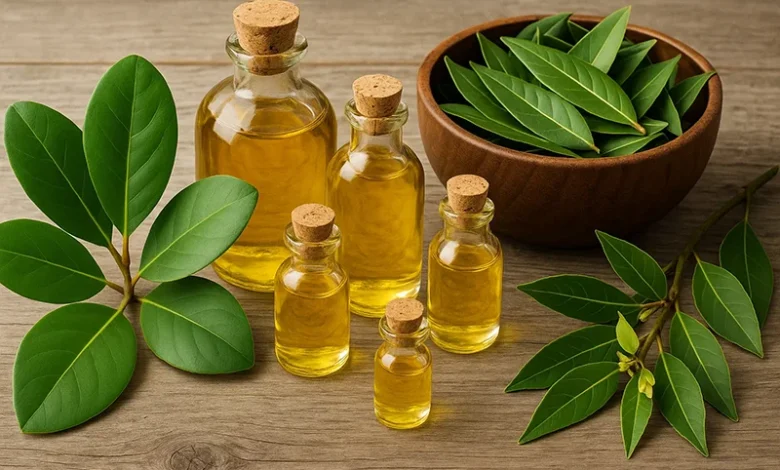Bay Oil from Dominica

Bay Oil occupies a unique place in Dominica’s agro-heritage and export economy, earning international recognition for its quality, potency, and cultural roots. Distilled from the leaves of the West Indian bay tree (Pimenta racemosa), this aromatic essential oil has been used for centuries in scenting cosmetics, crafting bay rum, and for therapeutic purposes. Its continued production reflects a blend of traditional knowledge, rural livelihoods, and the island’s push towards climate-resilient agriculture.
Dominica once produced up to 70% of the global supply of West Indian Bay Oil, before Tropical Storm Erika in 2015. Following the storm’s destruction of a key distillery in Petite Savanne, production sharply declined. The impact was compounded by Hurricane Maria in 2017, which devastated the network of artisanal distillers . Despite this, the bay tree demonstrated natural resilience, recovering within six months, though rebuilding distilling capacity has been a slower endeavour.
History, Production, and Market Presence of Bay Oil
Bay oil production dates back to the 19th century in Dominica, rooted in both practical and cultural uses. The island’s fertile volcanic soil and tropical climate provided optimal conditions for Pimenta racemosa, enabling widespread cultivation, even on steep hillsides. Traditionally distilled in copper stills using firewood, production yields range from 1.5% to 2.5%, with pure oils often favoured for their distinctive aroma profile full of eugenol, chavicol, methyl eugenol, and myrcene.
Currently, the Dominica Essential Oils & Spices Cooperative Society Ltd. manages artisanal distilleries in regions like Grand Bay, Petite Savanne, and Mahaut. The structure of production remains modest; cooperatives typically yield around 90–100 drums of 45 gallons each, equivalent to roughly 4,500 gallons per year. In 2003, bay oil sold for approximately EC$44 per pound (USD 16), a price that has since quadrupled amid global demand and supply instability.
Export markets currently include Europe, North America, perfume counts, and specialty health product manufacturers. Despite declining output due to past storms, renewed interest in natural and organic ingredients has sparked a gradual resurgence of Dominican bay oil .
Socioeconomic Impact and Cooperatives
Bay Oil production sustains rural communities by offering income opportunities on marginal land unsuited for conventional food crops. Farm families benefit from leaf harvesting and distillation tasks, often sharing intergenerational knowledge. The Cooperative model supports local ownership of distilleries, ensures equitable distribution of proceeds, and upholds quality control protocols .
Resilience has been tested by natural disasters, yet farmers have demonstrated adaptability. Reconstruction efforts post-Maria prioritized destilleries, supported in part by the Climate Resilience Execution Agency of Dominica (CREAD). Such institutional backing reinforced rural capacity, ensuring the small-scale sector could continue.
Challenges, Quality, and Supply Chain
Sustaining bay oil’s success requires clear attention to production consistency and competitive market positioning. Key constraints include:
- Firewood shortages affecting traditional distillation.
- Limited data on distillery capacity and tree acreage, which hinders strategic planning .
- Shifts in fragrance trends necessitate market diversification.
- While the resource itself is resilient, infrastructure vulnerability means another hurricane could disrupt supply chains again.
Resilience strategies include switching to more sustainable distillation energy sources like geothermal (linked to the Geothermal Energy Act), intensifying agroforestry to support tree regeneration, and strengthening supply chain traceability.
Innovation, Quality Assurance, and Agro-Processing
Bay Oil is part of Dominica’s expanding agro-processing sector alongside products such as soap, coconut oil, seamoss, herbal teas, and cocoa derivatives . Under the oversight of the Dominica Bureau of Standards and the National Centre of Testing Excellence, filtering purity, volatile compound analysis, and packaging standards are being improved.
Efforts include developing “Dominica Bay Oil” as a recognized geographic indicator, establishing traceability for export compliance, and offering training to operators through agro-processing hubs in Portsmouth and Roseau.
Cultural Heritage and Ecotourism Integration
Bay oil is also embedded in culture. Locally made Bay Rum remains a popular grooming product for men, and production sites are gaining traction as educational attractions. When combined with Nature Island brand and eco-tourism, bay leaf plantations and distilleries offer agritourism potential through visitor tours where tourists can learn about traditional medicine, distillation, and purchase directly.
Cultural festivals showcasing bay products at Creole celebrations, Jounen Kwéyòl, and local exhibitions reinforce this link, tying economic value to heritage and community identity.
Future Outlook and Strategic Priorities
A sustainable resurgence in bay oil production will depend on several strategic interventions:
- Increase distillery automation and sustainable fuel sources, reducing deforestation and increasing efficiency.
- Support grant-aid financing for small producers through entities like the Micro and Small Business Enterprise Act, Fiscal Incentives Act, and Small Business Support Unit.
- Promote geographic and organic certification, packaging design, and improving market access through regional groups like CROSQ and CARICOM.
- Explore exports into fragrance, aromatherapy, and wellness sectors, leveraging the post-pandemic demand for natural essential oils.
Key Support Strategies
- Sustainable distillation upgrades and transparent supply chain systems
- Capacity building, market linkages, and product certification pathways
Dominica’s Bay Oil heritage is rooted in both nature and culture. With reconstruction from past disasters largely complete, increasing focus on quality control, sustainable energy integration, and export readiness positions Bay Oil to reclaim global leadership. This small tropical treasure thus retains the potential to maintain rural economies, celebrate ecology, and drive agro-exports far into the future.




